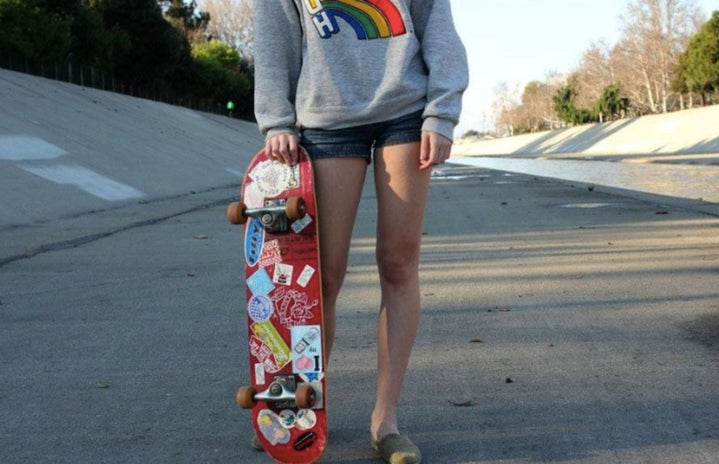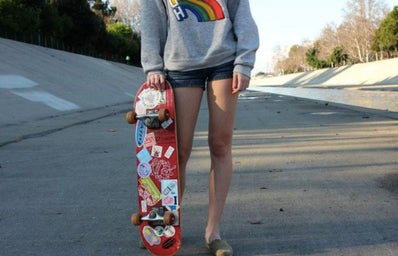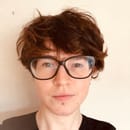As women, we all know about the importance of representation, particularly in male-dominated areas such as politics and sport. According to UNESCO, women make up 40% of sporting participants, yet we only receive 4% of sports media coverage, contributing to harmful gender stereotypes. This lack of representation can have a detrimental effect on women’s participation in sports. The Women’s Sports Foundation reported that 77% of female sports leaders feel a lack of exposure to female coaches limits girls’ participation. In comparison, 32% of girls have experienced boys making fun of them while they practice sports.
The worldwide skateboarding scene is no exception; it started in the 1940-the 50s and was pioneered by men. The first-ever skating magazine Skateboarder, whose first issue was released in 1964, was dominated by male skateboarders’ images until its final print issue in 1980; and the scene’s current biggest magazine Thrasher is still dominated by men to this day.
While things may have started to change recently with inclusive skateboarding groups popping up all over the country, and the introduction of Women’s skateboarding in the Tokyo 2020 Olympics. We’ve still got a long way to go until women feel as comfortable as men do at their local skatepark.
I caught up with Annie and Weezy, the founders of Brighton’s newest women and LGBTQ friendly skate group Brighton Skate Collective, to find out about their experiences as female skaters and some of the challenges they’ve faced.
Hey guys! Would you like to introduce yourselves?
Weezy: I’m Weezy, I’m 20, I go by she/they, and I’m from London.
Annie: I’m Annie; I go by she/they. I’m from Brighton. I’ve always lived here.
Lovely to meet you both! So how and when did you guys get into skating?
Weezy: I started properly skating two years ago. I used to longboard when I was a lot younger, but I was too scared to go to any of the [skate]parks ’cause none of my mates wanted to skate, so I used to just cruise around London. But then two years ago I started to get properly into it ’cause I found some people who wanted to skate with me.
So, did you find that having people to skate with helped you get into skating?
Weezy: Oh yeah, 100%, that’s one reason why we started Brighton Skate Collective. When I was in London, there were so many really inclusive groups, and that’s how I started skating. I went to House of Vans Girls Nights and Nike SB Girls Nights, and I met this girl who had this whole Whatsapp girl skating group in London. I joined it, and people would just be like, “Oh I’m out skating, do you wanna join?” and it just made it a lot easier to feel comfortable in [skate]parks.
Annie: I always wanted to skate, I’d see the boys doing it, but I was too scared. Most of my friends were girls growing up, and none of them wanted to skate. I started when I was 19; there’s a Girls’ Night at the Brighton Youth Centre, so I thought I’d turn up, by myself, see what it’s like. That’s where I met Weezy and became friends, so I’ve been skating for about a year now.
What’s your experience of being a female/LGBTQ skater? Have you faced any challenges?
Annie: I think there are a lot of experiences that are specific to female and LGBTQ skaters. Some positives are that there’s an instant connection with other female or queer skaters; because we’re so outnumbered in the skate parks, if you do see another female skater, it’s easy to just make friends and find that community. Also, in a community of female and queer skaters, it was easy for me to find people who are similar to me, dress like me, and have the same interests as me, which, as a bit of a tomboy, I’ve never really been able to do. However, there are negatives, such as impostor syndrome.
Weezy: Yeah, I was gonna say.
Annie: Boys start skating from a really young age, and girls aren’t included in that skate culture; they’re not represented in the skate parks, the magazines, etc. So often, it takes until adulthood to have the confidence to start skating. As girls often haven’t been skating as long [as boys have], they’re more likely to be at a beginner level. Skate culture shames beginners. You’re seen as a “poser” if you can’t do many tricks, which makes it even harder for women at a beginner level to feel like they can take up that space in the skate park alongside people who have been skating for a decade.
Weezy: Yeah, because guys get into it so much earlier, they kind of forget that whole beginner phase; even if you start at 18, they see that as really old, and can be a bit rude ’cause they don’t understand that you’re starting later than them, they forget how that was for them.
Annie: This culture of shaming “posers”, [guys don’t realise that] it’s excluding most female skaters who don’t start until adulthood.
Weezy: Yeah, people get so worried and scared to start skating ’cause they don’t want to be seen as a poser, they don’t want to be judged, they’re scared they’re going to do something wrong, but there shouldn’t be anything “wrong” to do with skating, you should be able to have fun and not be worried about doing something you’ll get judged for.
Annie: We’ve been shouted at by men, too. When they see us, a group of girls with our boards, they’re like, “Do a kickflip! Do a kickflip!” knowing that we probably can’t do a kickflip because we’re new to [skateboarding]. Weezy can, though, so that’s always really satisfying!
Weezy: Yeah, I feel really good when anybody says that to me now; I’m like “F*** you, I can do a kickflip!”
Annie: They’re taking the p*** out of us without realising that the reason we’re newer to skating is because of this sexist skate culture that doesn’t include women from a young age.
Weezy: 100%
Wow, this sounds like a lot! How did you guys overcome these challenges?
Weezy: I found people I felt comfortable with; like Annie said, the community with girls and LGBTQ skaters is so lovely ’cause everyone’s experiencing the same sort of judgement and fear, so you all kind of connect over that. Everyone’s so loving and supportive, and they don’t care how well you skate. Groups like that can make it a lot easier to get into skating; that’s how I felt comfortable.
Annie: I think women often find it hard to take up space in a skate park and to see it as their space, so if you have a whole group to turn up to the skate park with, it gives you a lot more confidence and makes it a lot easier to feel like you belong in that space.
Annie: Also, I think women are socialised to be less assertive than men, and that shows itself in the skate park where men won’t necessarily wait their turn. They’ll just go at every opportunity they have; they can sort of dominate the park.
Weezy: One bit of advice that’s helped me; I know it’s still so scary, but most guys just don’t care! They care so much more about the tricks they’re doing, and they only care about the guys who are doing better tricks than them. Skating is so much about showmanship, they want you to look at them and see what tricks they’re doing, and ultimately most of the time, they don’t even notice you. That’s always good to keep in mind when you’re going to [skate]parks.
Annie: That’s so true; it always feels more intimidating to people who haven’t skated before, then once you get used to it, you realise that nobody cares!
Sounds a bit like gym anxiety! So how would you describe Brighton Skate Collective; what is it to you?
Weezy: I describe it as a safe space, it’s targeted towards skating, but people can just come along and hang out and be with like-minded people. We’ve found that people are just looking for a nice group of people to hang out with, especially now, with Covid and lockdowns; people haven’t really met new people for a long time, so just being able to chat with people and hang out is really nice. What would you say, Annie?
Annie: I agree with that; I’d also say I like it to be a place where beginners feel welcome, to support people who want to try it but have maybe been too scared to take that first step of actually turning up.
Weezy: We want to be approachable; we want everyone to feel comfortable and welcome.
I love that! I feel so welcome! We’ve touched on this a bit already, but what inspired you guys to set up Brighton Skate Collective?
Weezy: I wanted to start up something like this when I moved to Brighton in my first year [of university]; after [being a part of] all my groups in London, I moved to Brighton, and there was nothing like that. There was Girls’ Night at BYC, but it wasn’t a group; it was more of an event. It wasn’t a family. So I wanted to set it up for ages, but I didn’t have the motivation to do it on my own! Then I met Annie, and she was so up for starting it together.
Annie: Yeah, personally, I didn’t think people would actually turn up! But our first post blew up a bit on Instagram; lots of people started saying they’d come, and I was like, “Woah I was not expecting this!”
Weezy: Yeah, I was expecting one or two people, maybe!
Annie: I think that shows there was a strong need for it; everyone I’ve spoken to agrees that it’s been so successful because people were desperate for something like this.
Weezy: Yeah, I was so confused [when I came to Brighton] ’cause I was also a part of Sibling Skate in London, which is an LGBTQ friendly skate scene, and I was like, “Why is there nothing like this in Brighton? It’s the biggest spot for it!”
I’m glad you guys bit the bullet and set it up! Do you have any advice for female or LGBTQ people thinking of taking up skating?
Weezy: Do it!
Annie: Do it! Also, be assertive and know that you do belong in a skate park; that space in the skate park is no more theirs than it is yours. Take up that space. It’s less intimidating than it seems.
Weezy: Also, wherever you are in the UK [there’s likely to be a group nearby]. When we were setting up Brighton Skate Collective, we followed so many accounts on Instagram that were doing the same thing as us in different areas; there are groups in Oxford, Edinburgh, Bristol… If you have a look on Instagram, you’ll find a women-friendly and LGBTQ-friendly group to skate with; I’m so sure there are people out there who want to skate with you and who will make you feel comfortable.
Annie: Yeah definitely, I think a lot have popped up over lockdown too.
Thank you so much, guys!
Weezy: You should come join us for a skate!
I’m looking forward to it!
Catch Weezy, Annie, and the rest of the Brighton Skate Collective crew on Instagram @brightonskatecollective


